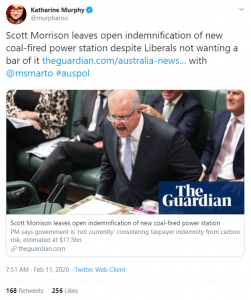The volume of misinformation circulating during the recent Australian bushfires was as pervasive as the country’s blazing landscape and seemingly permanent blanket of smoke that occupied large swathes of New South Wales and Victoria.
From declarations of an #ArsonEmergency, to the criticism of non-existent green policies on backburning, to the vast array of fake maps detailing fire activity, the amount of false information significantly muddied the waters of critical information and consensus on the issue of bushfires in Australia.
As worrying as this was the sentiment travelling to the heads of Australian politics and beyond including the Prime Minister of Australia himself, alongside a lamentable array of state premiers and business leaders. In November, Morrison gave an address indicating a “government crackdown against forms of activism and protests that the Coalition and the mining industry finds inconvenient.” This is the same Prime Minister who exclaimed in parliament that “This is coal – don’t be afraid!” whilst clutching a lump in his hands just over three years ago.
National party leader Michael McCormack dismissed the link between climate change and the recent bushfires as the words of “inner-city raving lunatics”. Most recently, we have also been subjected to mining magnate Andrew Forrest’s comments that fuel loads, not climate change, are the primary cause of bushfires.
Despite what, to many, are clear and disingenuous claims made by both low-level users and significant individuals in positions that influence the direction of countries in the midst of climate catastrophe, there appears to be very little in the way of accountability, fact checking or culpability by any party.
The AFP fact checking website has reported that many fewer people have been charged with arson than have been reported, also noting that several photographs which have circulated online are indeed a few years old.
Climate change expert Professor Will Steffen, in a recent article by the Guardian, summarises best the risk of disingenuous information in the era of social media: “People who are for whatever reason trying to put out false or extremely misleading information are actually doing a huge disservice to the risk to human life in the future, the risk to property, the risk to the natural world, and indeed the risk to economy.”

 Social Due Diligence
Social Due Diligence 

